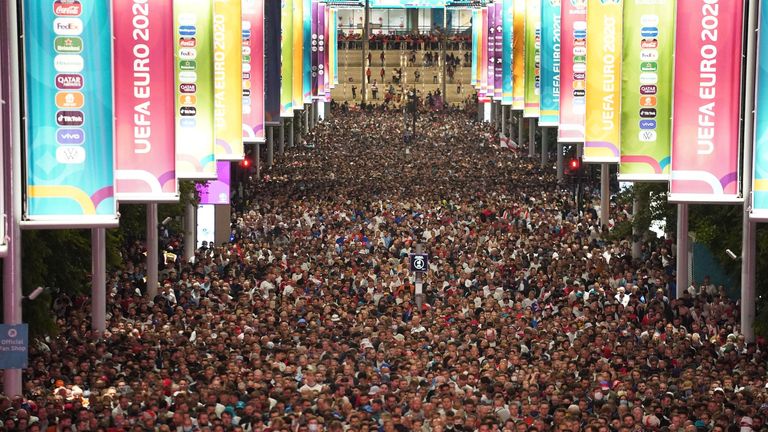Euro 2020: “Football’s coming home,” is the chant of England soccer fans at this year’s Euro 2020 tournament, but with it may come COVID-19.
England faces Italy on Sunday in the final at London’s Wembley Stadium, which has already hosted two semi-finals over two days this week with crowds of around 60,000 people.
And while Wednesday’s semi-final victory over Denmark was greeted with jubilation, England is facing a new wave of COVID-19 cases, fuelled by a combination of a highly contagious variant and its emergence from a third lockdown.
The World Health Organization (WHO) called for better monitoring of Euro 2020 football matches as Covid infections climb again in Europe, fuelled by the deadly Delta variant that is racing around the globe https://t.co/Oor5T5c240 pic.twitter.com/omQwlcIxPF
— AFP News Agency (@AFP) July 1, 2021
Euro 2020: Italy has also seen coronavirus cases picking up, and epidemiologists in both countries warn that Euro 2020 might fuel its spread among younger, mainly male, adults.
“It’s that demographic, those football-loving, male, predominantly, individuals of a particular age group that we’re now seeing a surge in,” Denis Kinane, an immunologist, and co-founder of testing company Cignpost Diagnostics told Reuters.
Euro 2020: Denmark players get heroes welcome at home after making it to Euro 2020 semifinals
“So, just as we unlock socially … we’re actually going to have a spike,” Kinane said, adding that the virus could spread to family members.
Imperial College has found a quadrupling of COVID-19 in England in the last month, with women 30% less likely to test positive due to differences in social mixing which could, at least in part, be driven by Euro 2020.

Euro 2020: “The most plausible explanation is that men are having more frequent close contacts,” Steven Riley, Professor of Infectious Disease Dynamics at the London University, told Reuters.
Germany has queried Europe’s soccer governing body UEFA’s move to allow bigger crowds in stadiums as the tournament has gone on, while the World Health Organization (WHO) has flagged the importance of looking beyond stadiums to pubs and bars where people gather for matches.
London’s Wembley matches are “pilot events” which allow for larger crowds where fans must test negative for COVID-19 or be fully vaccinated against the coronavirus.
Doctors battling record numbers of COVID-19 deaths in St. Petersburg were worried when soccer fans gathered for the quarter-final between Spain and Switzerland.
Euro 2020: ‘SCARY’ CELEBRATIONS
Although British Prime Minister Boris Johnson has delayed the full reopening of England’s economy until July 19, a week after the final, people can still gather in bars and pubs.
Before the semi-final, Johnson urged fans to support England “enthusiastically, but in a responsible way.”
For a nation swept up in footballing fervor after 55 years since England’s last major final and 16 months of restrictions, politicians loathe dampening the celebrations.
Jubilant fans were pictured packing bars, streets, and even clambering on top of a London bus in the aftermath of England’s extra-time 2-1 victory over Denmark, with fan zones highlighted by some as a particular risk for transmission.
“I think the stadiums are being correctly managed … (but) the fact that we’ve got the whole nation now celebrating – and rightly so – it’s scary,” said Keith Still, visiting professor of Crowd Science at Suffolk University, told Reuters.
In Italy, Carlo Signorelli, professor of Hygiene and Public Health at San Raffaele University in Milan, said masks could stop the spread of droplets among singing or chanting fans.
“We’ve had them for a long time, so putting them on for one more evening won’t be the end of the world,” he told Italy’s La Repubblica newspaper.